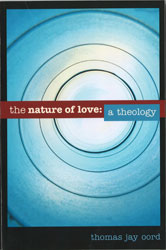
Challis Press, 2010
RRP $45.95
Reviewed by Karyl Davison.
THOMAS JAY Oord, minister in the Church of the Nazarene and professor at Northwest Nazarene University, has written or contributed to dozens of books on topics like post modernity, the problem of evil, and the meaning of holiness.
However, behind all his work has been a passion for the love of God.
This compact volume addresses this fundamental passion for the love of God.
Have a look at your books on Theology. Chances are that they begin with the Scriptures, or Creation, the Trinity or Faith or even Ecclesiology.
Mr Oord offers a theology which begins and ends with God’s love, as revealed in Jesus Christ.
In the first two sections of The nature of love Mr Oord defines love: to love is to act intentionally, in sympathetic/empathetic response to God and others, to promote overall well-being.
He goes on to explore several words in the Bible that are translated as love, exploring what they mean and how they might contribute to an understanding of the “love of God”.
He then explores the theologies of two major theologians: Nygren a 20th century theologian whose understanding of "agape" has had wide influence in the modern church, and Augustine who was instrumental in laying the foundation for "western theology".
Finally, Mr Oord introduces his love theology as "essential kenosis" which describes God’s self-giving nature.
This self-giving nature of God then becomes the foundation for interpreting everything else there is to know and say about God.
This is contrary to traditional theories which propose that God voluntarily self-limits Godself in relation to creation, whereas Oord’s view is one of involuntary divine self-limitation.
The difference between the two is that the latter removes the contingent aspect of love in relation to creation.
That is, there is nothing outside of God that imposes limitations on God, and any limitations in God exist by virtue of God’s own nature what it means to be God.
As one whose nature is love, "God necessarily gives freedom and/or agency to others and cannot withdraw, override, or fail to provide freedom/agency" (p. 126).
Mr Oord’s writing is accessible, clear and concise.
He sticks with his main thesis throughout the book: that a robust theology of love must be at the centre of the Christian faith.
The nature of love is a helpful and thought provoking contribution to our understanding of Christian theology.
 JourneyOnline
JourneyOnline






